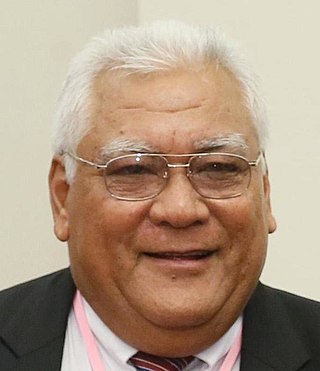The politics of Tuvalu takes place in a framework of a parliamentary representative democratic monarchy, whereby the monarch is the head of state, represented by the governor-general, while the prime minister is the head of government. Executive power is exercised by the government.

Maatia Toafa OBE is a Tuvaluan politician, representing Nanumea, who served two non-consecutive terms as Prime Minister of Tuvalu. He first served as prime minister, and foreign minister, from 2004 to 2006, from the resignation of his predecessor, Saufatu Sopoanga, until the defeat of his Cabinet in the 2006 general election. From 2004 to 2006 he also held the role of foreign minister.
Tuvalu elects a legislature on a national level. The Parliament of Tuvalu has 16 members, elected for a four-year term in 8 double-seat constituencies. Tuvalu is a de facto non-partisan democracy since it does not have political parties. The political system is based on personal alliances and loyalties derived from clan and family connections. It does tend to have both a distinct government and a distinct opposition. The 16 members of the current parliament are elected from eight two-seat constituencies via plurality block voting.
Sir Fiatau Penitala Teo was a political figure from the Pacific nation of Tuvalu. Teo was appointed Chief in the House of Chiefs of Niutao in 1945 and was reappointed as a Chief on 29 June 1997 after his service as the first Governor General of Tuvalu.

The Parliament of Tuvalu is the unicameral national legislature of Tuvalu. The place at which the parliament sits is called the Vaiaku maneapa. The maneapa on each island is an open meeting place where the chiefs and elders deliberate and make decisions.

Sir Kamuta Latasi is a political figure from the Pacific nation of Tuvalu from Funafuti atoll. He was elected to the Parliament of Tuvalu in 1992. Latasi served as the 4th prime minister, and foreign minister, from 1993 until 1996. He has served as the Speaker of parliament from 2006 to September 2010 and again from December 2010 to March 2014.

Willy Telavi is a Tuvaluan politician who was Prime Minister of Tuvalu from 2010 to 2013.

Kausea Natano is a politician who served as the Prime Minister of Tuvalu from 19 September 2019 to 26 February 2024. He represented Funafuti as a Member of Parliament. He was first elected in the 2002 Tuvaluan general election and served as an MP until he was unseated in the 2024 Tuvaluan general election.
Parliamentary elections were held in Tuvalu on 16 September 2010. Voters elected fifteen members of the Parliament to a four-year term. All candidates were independents, as there are no political parties in the country. Ten out of the fifteen incumbent members were re-elected. The remaining five incumbents, including Deputy Prime Minister Tavau Teii, did not retain their seats. The incumbent Prime Minister, Apisai Ielemia, retained his seat in Vaitupu constituency. On 29 September, Maatia Toafa from Nanumea won eight of the fifteen votes to become Prime Minister.

Enele Sosene Sopoaga PC is a Tuvaluan diplomat and politician who was Prime Minister of Tuvalu from 2013 to 2019.
The Cabinet of Tuvalu is the executive branch of the government of Tuvalu.
Elisala Pita OBE was a Tuvaluan politician.

Samuelu Penitala Teo is a Tuvaluan politician. He is the son of Sir Fiatau Penitala Teo who was appointed as the first Governor General of Tuvalu (1978–1986) following independence from Great Britain. Samuelu Teo himself served as the Acting Governor-General of Tuvalu from January until 28 September 2021. He had succeeded Acting Governor-General Teniku Talesi and remained in office until the Rev. Tofiga Vaevalu Falani was sworn in as the 10th Governor-General in September 2021.

General elections were held in Tuvalu on 9 September 2019. There were 37 candidates seeking election to the Parliament, two of whom were women: Valisi Alimau, who was contesting in the Nukufetau electorate, and Puakena Boreham who was seeking re-election in the Nui electorate.

Simon Kofe is a Tuvaluan politician. He was appointed as the Minister for Justice, Communication & Foreign Affairs, in the cabinet of Kausea Natano following the 2019 Tuvaluan general election.
The Natano Ministry was the 15th ministry of the Government of Tuvalu, led by Prime Minister Kausea Natano. It succeeded the Sopoaga Ministry upon its swearing in by the acting Governor-General, Mrs. Teniku Talesi Honolulu, on 18 September 2019.
General elections were held in Tuvalu on 26 January 2024. There are no political parties in Tuvalu and all candidates run as independents.








